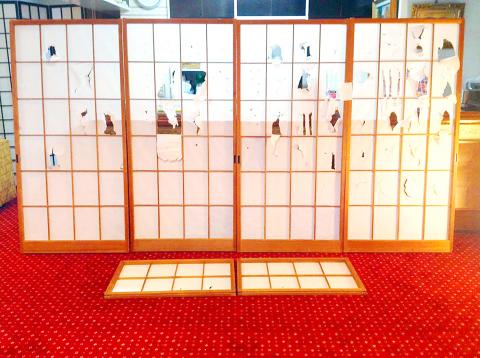Two unnamed Taiwanese tourists gained instant notoriety yesterday after photographs of a Japanese hot spring hotel room that they are suspected of wrecking were circulated widely online.
The photos were reportedly posted on Facebook by a Taiwanese woman under the name Miki Juan. According to the page, the woman works at a hotel in Nasu District, Tochigi Prefecture, on Japan’s Honshu Island.
“Our hotel cares very much about the tourists from Taiwan and has been friendly to them. However, two Taiwanese tourists who stayed at the hotel last night chose to repay the kindness this way [referring to a photo of the room,” she wrote. “Four sliding doors and two windows in the Japanese-style room were completely destroyed. The hotel owner’s wife, who is also Taiwanese, was so angry that she was in tears.”

Photo: CNA
The photographs and messages were subsequently shared by more than 5,000 netizens, many of whom also responded to her posts, condemning the “acts of vandalism.”
“Do they think that they are still in a Taiwanese night market, playing some kind of ‘poke-and-win’ game?” one commenter said. “The compensation will probably mean nothing to these brats, whose parents will pay for the damage.”
Though Juan said the hotel has asked the travel agency to seek compensation on its behalf, another netizen using the name Kevin Chung said the hotel was being too nice to the suspects and should disclose their names so that they would avoid repeating such shameful acts.
Juan said that the two Taiwanese tourists are minors who had not traveled with their parents, adding that she could not reveal their names because it would violate the Personal Information Protection Act (個人資料保護法).
She also said that her aim was not to publicly shame them.
“My purpose is not to find or punish them. Instead, I want to get Taiwanese thinking about how they should behave themselves when they travel overseas,” she said.
“I worked in a Taiwanese travel agency before and it was really embarrassing to hear complaints about our clients from our business partners in Japan. However, I was really furious this time. We have worked so hard to encourage Japanese to pay more attention to Taiwanese tourists and all these efforts could go down the drain because of the misbehaving few,” she said.
Juan said that the two tourists apologized and paid for the damage, urging people to refrain from trying to identify and locate them.
Travel Agent Association secretary-general Roget Hsu (許高慶) said that this was the first time that he heard of such an incident.
“This case shows that more needs to be done to enhance citizenship education in Taiwan,” he said.

AIR SUPPORT: The Ministry of National Defense thanked the US for the delivery, adding that it was an indicator of the White House’s commitment to the Taiwan Relations Act Deputy Minister of National Defense Po Horng-huei (柏鴻輝) and Representative to the US Alexander Yui on Friday attended a delivery ceremony for the first of Taiwan’s long-awaited 66 F-16C/D Block 70 jets at a Lockheed Martin Corp factory in Greenville, South Carolina. “We are so proud to be the global home of the F-16 and to support Taiwan’s air defense capabilities,” US Representative William Timmons wrote on X, alongside a photograph of Taiwanese and US officials at the event. The F-16C/D Block 70 jets Taiwan ordered have the same capabilities as aircraft that had been upgraded to F-16Vs. The batch of Lockheed Martin

GRIDLOCK: The National Fire Agency’s Special Search and Rescue team is on standby to travel to the countries to help out with the rescue effort A powerful earthquake rocked Myanmar and neighboring Thailand yesterday, killing at least three people in Bangkok and burying dozens when a high-rise building under construction collapsed. Footage shared on social media from Myanmar’s second-largest city showed widespread destruction, raising fears that many were trapped under the rubble or killed. The magnitude 7.7 earthquake, with an epicenter near Mandalay in Myanmar, struck at midday and was followed by a strong magnitude 6.4 aftershock. The extent of death, injury and destruction — especially in Myanmar, which is embroiled in a civil war and where information is tightly controlled at the best of times —

China's military today said it began joint army, navy and rocket force exercises around Taiwan to "serve as a stern warning and powerful deterrent against Taiwanese independence," calling President William Lai (賴清德) a "parasite." The exercises come after Lai called Beijing a "foreign hostile force" last month. More than 10 Chinese military ships approached close to Taiwan's 24 nautical mile (44.4km) contiguous zone this morning and Taiwan sent its own warships to respond, two senior Taiwanese officials said. Taiwan has not yet detected any live fire by the Chinese military so far, one of the officials said. The drills took place after US Secretary

US President Donald Trump yesterday announced sweeping "reciprocal tariffs" on US trading partners, including a 32 percent tax on goods from Taiwan that is set to take effect on Wednesday. At a Rose Garden event, Trump declared a 10 percent baseline tax on imports from all countries, with the White House saying it would take effect on Saturday. Countries with larger trade surpluses with the US would face higher duties beginning on Wednesday, including Taiwan (32 percent), China (34 percent), Japan (24 percent), South Korea (25 percent), Vietnam (46 percent) and Thailand (36 percent). Canada and Mexico, the two largest US trading